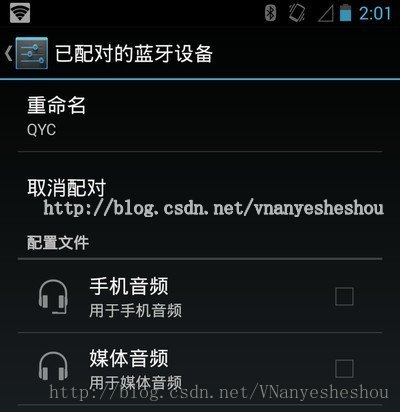上一篇说了下A2DP的一些基本操作,这篇分析下系统应用、系统源码是如何操作A2DP的。尤其是其连接过程,基于Android4.3源码。Andorid手机一般都是做为A2DP Audio Source端。
| 1 连接过程 |
媒体音频也就是A2DP,首先连接的蓝牙设备需要支持A2DP协议(并且做为A2DP Audio Sink端),并且需要与该设备进行配对,如何进行蓝牙配对这里就不细说了,可以参照我的其他文章。主要分析下其连接过程。
对于系统自带应用Settings中已配对的蓝牙设备界面(如下图所示):

其对应文件路径:
packages/apps/Settings/src/com/android/settings/bluetooth/DeviceProfilesSettings.Java
点击媒体音频进行连接,调用onPreferenceChange。
public boolean onPreferenceChange(Preference preference, Object newValue) {
if (preference == mDeviceNamePref) { //重命名
mCachedDevice.setName((String) newValue);
} else if (preference instanceof CheckBoxPreference) {//check box
LocalBluetoothProfile prof = getProfileOf(preference); //获取对应的profile
onProfileClicked(prof, (CheckBoxPreference) preference);
return false; // checkbox will update from onDeviceAttributesChanged() callback
} else {
return false;
}
return true;
}接着看onProfileClicked()函数处理
private void onProfileClicked(LocalBluetoothProfile profile, CheckBoxPreference profilePref) {
BluetoothDevice device = mCachedDevice.getDevice(); //获取配对的蓝牙设备
int status = profile.getConnectionStatus(device); //获取profile的连接状态
boolean isConnected =
status == BluetoothProfile.STATE_CONNECTED;
if (isConnected) { //如果是连接状态则断开连接
askDisconnect(getActivity(), profile);
} else { //没有连接
if (profile.isPreferred(device)) { //获取profile是否是首选
// profile is preferred but not connected: disable auto-connect
profile.setPreferred(device, false); //设置对应profile的PRIORITY 为off,防止自动连接
refreshProfilePreference(profilePref, profile); //刷新check box状态
} else {
profile.setPreferred(device, true); //设置对应profile的PRIORITY 为on
mCachedDevice.connectProfile(profile); //连接指定profile
}
}
}接着查看CachedBluetoothDevice中的connectProfile函数连接某一profile。
void connectProfile(LocalBluetoothProfile profile) {
mConnectAttempted = SystemClock.elapsedRealtime();
// Reset the only-show-one-error-dialog tracking variable
mIsConnectingErrorPossible = true;
connectInt(profile); //连接profile
refresh(); // 刷新ui
}
synchronized void connectInt(LocalBluetoothProfile profile) {
//查看是否配对,如果没有配对则进行配对,配对后进行连接,
//如果配对则直接连接
if (!ensurePaired()) {
return;
}
if (profile.connect(mDevice)) {//连接
return;
}
}connectInt()函数中会先判断是否配对,如果没有配对则开始配对,配对成功后连接profile。
如果已经配对则直接连接profile。
对于profile.connect(mDevice)会根据profile调用各自对应的connect方法。(如手机音频则对应HeadsetProfile,媒体音频对应A2dpProfile)。这里查看手机音频的连接A2dpProfile。
public boolean connect(BluetoothDevice device) {
if (mService == null) return false;
//获取连接hfp的设备
List<BluetoothDevice> sinks = mService.getConnectedDevices();
if (sinks != null) {
for (BluetoothDevice sink : sinks) {
mService.disconnect(sink); //断开连接
}
} //连接hfp。
return mService.connect(device);
}mService.connect跳到Bluetooth应用中,
代码路径:packages/apps/Bluetooth/src/com/android/bluetooth/a2dp/A2dpService.java
先调用到内部类BluetoothA2dpBinder的connect方法。
public boolean connect(BluetoothDevice device) {
A2dpService service = getService();
if (service == null) return false;
return service.connect(device);
}该方法中很明显是去调用A2dpService的connect方法。接着看A2dpService中的connect
public boolean connect(BluetoothDevice device) {
enforceCallingOrSelfPermission(BLUETOOTH_ADMIN_PERM,
"Need BLUETOOTH ADMIN permission");
if (getPriority(device) == BluetoothProfile.PRIORITY_OFF) {
return false; //检查priority
}
int connectionState = mStateMachine.getConnectionState(device);
if (connectionState == BluetoothProfile.STATE_CONNECTED ||
connectionState == BluetoothProfile.STATE_CONNECTING) {
return false; //检查连接状态
}
mStateMachine.sendMessage(A2dpStateMachine.CONNECT, device);
return true;
}A2dpService的connect()函数会对priority和连接状态进行必要的检查,不符合条件则返回false。符合条件则向状态机发送消息A2dpStateMachine.CONNECT。
此时A2dpStateMachine中状态应该是Disconnected,所以查看Disconnected state中的处理
BluetoothDevice device = (BluetoothDevice) message.obj;
//发送广播,正在连接A2DP
broadcastConnectionState(device, BluetoothProfile.STATE_CONNECTING,
BluetoothProfile.STATE_DISCONNECTED);
//连接远端设备。
if (!connectA2dpNative(getByteAddress(device)) ) {
//连接失败,向外发送连接失败广播
broadcastConnectionState(device, BluetoothProfile.STATE_DISCONNECTED,
BluetoothProfile.STATE_CONNECTING);
break;
}
synchronized (A2dpStateMachine.this) {
mTargetDevice = device; //mTargetDevice要连接的设备
transitionTo(mPending); //切换到pending状态
} //超时处理
sendMessageDelayed(CONNECT_TIMEOUT, 30000);static jboolean connectA2dpNative(JNIEnv *env, jobject object, jbyteArray address) {
jbyte *addr;
bt_bdaddr_t * btAddr;
bt_status_t status;
if (!sBluetoothA2dpInterface) return JNI_FALSE;
addr = env->GetByteArrayElements(address, NULL);
btAddr = (bt_bdaddr_t *) addr;
if (!addr) {
jniThrowIOException(env, EINVAL);
return JNI_FALSE;
}
if ((status = sBluetoothA2dpInterface->connect((bt_bdaddr_t *)addr)) != BT_STATUS_SUCCESS) {
}
env->ReleaseByteArrayElements(address, addr, 0);
return (status == BT_STATUS_SUCCESS) ? JNI_TRUE : JNI_FALSE;
}其中sBluetoothA2dpInterface->connect会跳到hardware、蓝牙协议栈进行连接,这就先不进行分析了。
| 2 状态回调 |
当协议栈连接状态改变会回调com_android_bluetooth_a2dp.cpp中的方法bta2dp_connection_state_callback。
static void bta2dp_connection_state_callback(btav_connection_state_t state, bt_bdaddr_t* bd_addr) {
jbyteArray addr;
if (!checkCallbackThread()) { \
return; \
}
addr = sCallbackEnv->NewByteArray(sizeof(bt_bdaddr_t));
if (!addr) {
checkAndClearExceptionFromCallback(sCallbackEnv, __FUNCTION__);
return;
}
sCallbackEnv->SetByteArrayRegion(addr, 0, sizeof(bt_bdaddr_t), (jbyte*) bd_addr);
sCallbackEnv->CallVoidMethod(mCallbacksObj, method_onConnectionStateChanged, (jint) state,
addr);
checkAndClearExceptionFromCallback(sCallbackEnv, __FUNCTION__);
sCallbackEnv->DeleteLocalRef(addr);
}bta2dp_connection_state_callback方法中会从cpp层调用到java层,对应于A2DPStateMachine中的onConnectionStateChanged函数
private void onConnectionStateChanged(int state, byte[] address) {
StackEvent event = new StackEvent(EVENT_TYPE_CONNECTION_STATE_CHANGED);
event.valueInt = state;
event.device = getDevice(address);
sendMessage(STACK_EVENT, event);
}onConnectionStateChanged函数中发送消息STACK_EVENT(携带状态和蓝牙地址),此时是Pending state,收到该消息调用processConnectionEvent。
正常连接成功应该会先收到CONNECTION_STATE_CONNECTING状态,然后收到CONNECTION_STATE_CONNECTED状态。
//发送广播,连接成功
broadcastConnectionState(mTargetDevice, BluetoothProfile.STATE_CONNECTED,
BluetoothProfile.STATE_CONNECTING);
synchronized (A2dpStateMachine.this) {
mCurrentDevice = mTargetDevice;//mCurrentDevice表示已连接的设备
mTargetDevice = null; //mTargetDevice表示要连接的设备
transitionTo(mConnected);//切换到Connected状态
}收到CONNECTION_STATE_CONNECTED状态,后向外发送连接成功的广播,状态机切换到Connected状态。
private void broadcastConnectionState(BluetoothDevice device, int newState, int prevState) {
//AudioManager设置A2DP的连接状态
int delay = mAudioManager.setBluetoothA2dpDeviceConnectionState(device, newState);
mWakeLock.acquire();
//延时处理,发送广播
mIntentBroadcastHandler.sendMessageDelayed(mIntentBroadcastHandler.
obtainMessage(MSG_CONNECTION_STATE_CHANGED,
prevState,newState,device),
delay);
}broadcastConnectionState中会向AudioManager中设置A2DP的连接状态,返回值用来延时发送广播。AudioManager设置A2DP的连接状态非常重要,这样音频系统根据当前状态,判断音频从哪里发出(蓝牙a2dp、扬声器、耳机)。